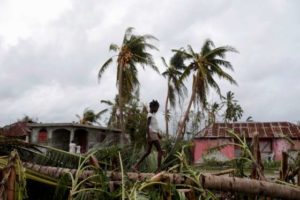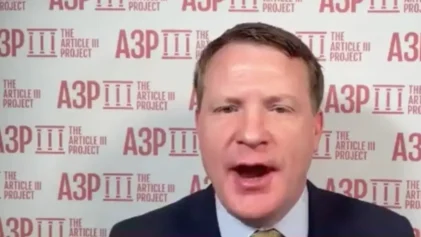
Photo by Carlos Garcia Rawlins/Reuters
Gaining strength day by day as it spiraled over the Atlantic, Hurricane Matthew unleashed its fury on the tiny island nation of Haiti on Thursday. The powerful Category 4 storm has since moved on, but the path of death and destruction it left behind is insurmountable.
According to Reuters, a count of fatalities reported by Haiti’s civil protection and local officials confirmed 842 people lost their lives in the storm. With cellphone towers down and roadways flooded with water, aid workers are struggling to reach those who survived.
Videos and photos of the hurricane’s impact on the island nation have since gone viral. But the disaster has some social media users wondering where are the #PrayforHaiti hashtags and fancy flag filters that are often afforded to other countries affected by tragedy?
It’s not uncommon for social media sites like Facebook and Twitter to create hashtags and special filters to acknowledge international tragedies like the recent bombings in Brussels or the terror attack in Paris. However, people have noticed that the same love and attention isn’t given to countries with majority “melanated” populations.
“When tragedy struck in France, there was a special French flag filter that everyone and their mother could use on Facebook to show that they were standing with France,” blogger Neffer Kerr wrote in an op-ed for Ebony. “I saw people who don’t speak a lick of French, have never been to France, and don’t know anyone there, using this filter for weeks. Why? Because when jacked up things happen in the world, we should care. Except for when it happens in Haiti.”
Kerr also pointed out the lack of international solidarity and outpouring for the 147 students killed during an attack at Kenya’s Garissa University or the victims of the countless murders, bombings and kidnappings carried out by terrorist group Boko Haram.
“Where are the profile picture flags being advertised to say we stand with and support them as well?” she said. “Why are we forced to seek out and create our own filters to stand in solidarity with those who live in melanated countries when they are affected, often on a grander and more frequent scale, by tragedy?”
Several people took to social media to echo the same frustrations.
https://twitter.com/undisturbedsoul/status/784021139655884801
Why is it that there's no #Pray4Haiti even though 300+ people have died??🤔 🤔Asking for a friend..
— ✨tom wambsgans ✨ (@LowKehLah) October 7, 2016
lovin' how #PrayForFlorida is trending, but a third world country that can't easily be as safe didn't. 😪#PrayForHaiti
— douglæs (@isleux) October 6, 2016
https://twitter.com/LeslieMac/status/783295994385412096
https://twitter.com/Dos_Twinjas/status/784436768548544512
https://twitter.com/tiffrussworld/status/784436263638171648
Hey @facebook I'm waiting for an option to put Haiti's flag colors over my profile picture. #847dead #prayforhaiti #praysendfundssendpeople
— Drucilla (@_drucilla_) October 7, 2016
The online community didn’t remain largely silent, as celebrities reached out to offer their prayers to the people of Haiti and others affected by the storm.
My heart absolutely breaks for Haiti 🇭🇹 !!! Prayers up for my brothers and sisters who've fallen victim to this tragic event! 🙏🏿
— Rihanna (@rihanna) October 5, 2016
My thoughts and prayers go out to all of those in Haiti affected by #HurricaneMatthew. For those in its path, please stay safe. ❤
— EVE (@TheRealEve) October 6, 2016
Sending prayers up. 🙏🏾 #HurricaneMatthew
— kerry washington (@kerrywashington) October 5, 2016
According to Caribbean News Now, the Haitian government is asking the international community for immediate humanitarian assistance. The UN World Food Program (WFP) and the UN Children’s Fund (UNICEF) are currently mobilizing resources to aid the people of Haiti, the news site reports.
“Our priority is to support the governments’ interventions to save lives and meet the food needs of the most vulnerable and food insecure people affected,” said Miguel Barreto, WFP regional director for Latin America and the Caribbean.
The island nation was still struggling to recover from a devastating 7.0 magnitude earthquake in 2010. Per The New York Times, Haiti’s infrastructure had been crumbling even before the earthquake and hurricane hit, thus exacerbating old problems for the country. The nation’s weakened communications systems and government’s inaction to prepare for such a disaster simply adds insult to injury. That’s when international relief workers are called in.
“There was a lot of taking stock of what lessons were learned after 2010,” Jake Johnston, research associate at the Center for Economic and Policy Research in Washington, said of Hurricane Matthew’s impact. “And then you see a disaster and it all goes out the window and it’s immediate, whatever we can do as fast as possible.”


